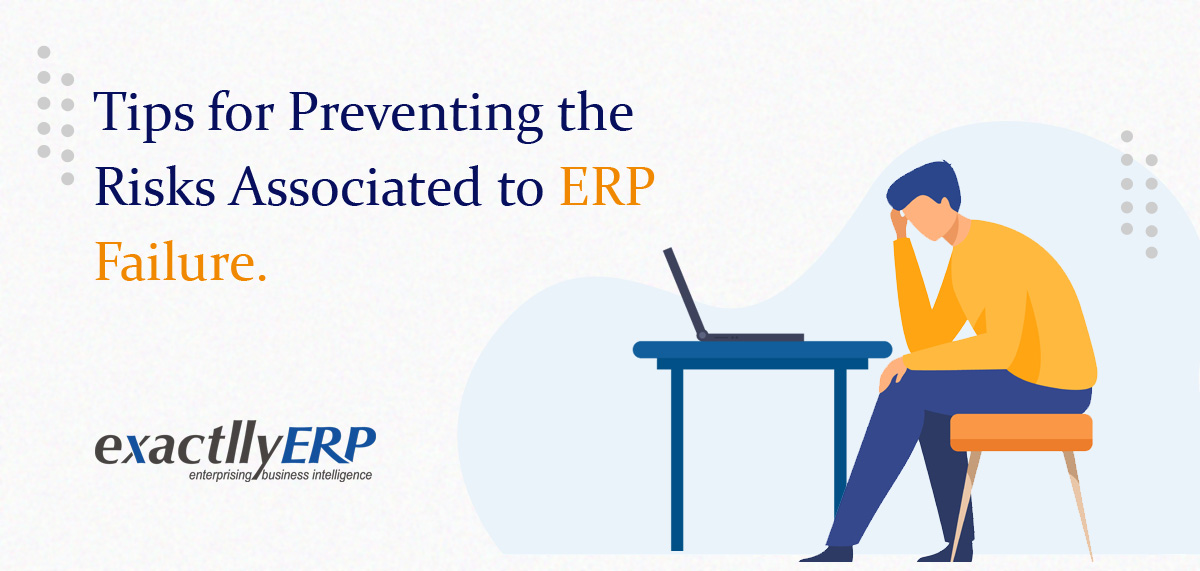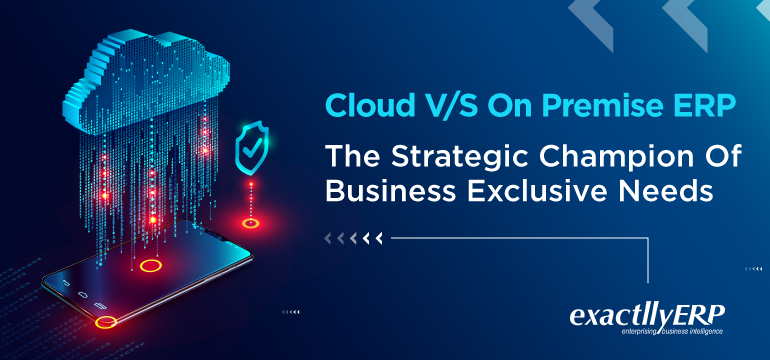Tips for Preventing the Risks Associated to ERP Failure

Social media is pretty much about ERP failure these days. How can your organization avoid similar mistakes that the high-profile brands mistakenly committed? It is first vital to understand that an ERP implementation failure doesn’t become obvious until later. It only does when it has become too late. An understanding of typical ERP software implementation mistakes can help in constructing a project plan for the prevention of ERP failure. Along with the implementation of ERP software, boosting business processes is necessary simultaneously.
Typical ERP Implementation Failure Reasons:
Preventing the risks associated with ERP failure is possible with these important tips. Go through each to understand more.
- Treating Projects like Technology Initiatives –
Most businesses while trying to implement new ERP software think about ERP failure rather than success which is a wrong step. ERP implementation can only boost sales order and attain success when these are addressed as digital transformations. It is vital to emphasize only processes and people and not getting mind-boggled over Oracle vs. SAP. The organization must witness the ERP software from Exactlly as a catalyst for positive change.
- Nil Establishment of Robust Project Governance –
Before implementing an ERP system and deciding on various ERP projects, every company needs to be equipped with a project governance system. This guarantees that the project team takes decisions that are in sync with the project objectives. It is very much advisable for employing a project charter for assigning particular team members the duties of approving requests like customization requests. Other employees and executives can also make requests for enhancing project cost and scope. When there are robust project controls, the employees will only agree to requests that line up with the company’s vision. It will largely decrease the risks associated to timeline overruns and budget.
- Exploiting ERP Consultants –
It is true that to get hands-on best ERP software practices, it is vital to employ ERP consultants. But if a business relies too much on the consultants then it can anytime backfire. So this is a common ERP implementation failure that organizations must stay away from. Discovering the correct balance is vital by frequently taking suggestions along with guaranteeing the fact that the company has the concluding say on crucial decisions. So when there is an ERP business collaboration and a company employs an ERP consultant, the expert must provide assistance in constructing a hub of excellence. By this, a company will not have to rely on consultants for the long-term.
- Permitting ERP software for Describing Future Procedures –
The functionality of ERP software largely helps in defining backend processes. However, redesigning the other procedures is vital prior to software selection. For instance, when the goal is enhancing the supply chain, it is crucial to discover the pain points during the requisite gathering workshops. When the business requisites are crystal clear, the business must guarantee that the selected ERP software aligns perfectly with the organizational objectives. The requisites offer ERP vendors a structure for demonstrating the software.
- Adhering to Timelines and Budget Anticipations –
When the matter is about ERP in retail industry and ERP in construction industry, embarking on such projects call for setting only realistic anticipations. For instance, the change resistance is a very big challenge in comparison to its anticipation. The goal must be sticking to the original budget along with people adopting the optimized procedures. When the scenario is like this, adjusting the budget is a necessity for justifying the long-standing gains.
- Overlooking Change Management –
One of the biggest mistakes for which ERP implementation failure takes place is abandoning change management. Most businesses never realize the effect that end-users can pose on the success of ERP system implementation. Due to this, businesses tend not to put their money in activities of change management like regular communication. Preventing ERP failure mistakes like this is possible by emphasizing conquering change resistance. Organizations must construct a proper change management map that incorporates a training plan, sponsorship roadmap and coaching plan.
- Not Expanding a Business Case –
This ERP failure mistake can easily be avoided. As the saying goes that nothing can be achieved without measuring, it is vital that the business case assists in measuring business advantages before and after implementation. This will aptly help in mitigating the ERP investment. It also helps in aligning the stakeholders around the ERP project goals and helps in setting practical expectations. When a business truly needs to enhance its customer service, then it must incorporate this in the business case by enumerating the enhancements that are anticipated.
- Not Including Executives –
The executive team of any business must always be welcomed in taking decisions related to the key projects. Not doing this will not help in preventing the risks associated with ERP failure. Here the matter is not just about speaking on the budget approval. What matters here the most are the ongoing decisions regarding project objectives. The transformations to business procedures must also be considered.
Assessing the Risks of ERP Software Implementation:
Avoiding the ERP implementation failure mistakes as mentioned above will largely help businesses in maintaining a proper balance. But discovering the mistakes always is not very easy. The minute mistakes are sometimes not highly noticeable until these amalgamate into larger challenges. Objectively evaluating risks will be problematic if you are not submerged in the various project details. The three important tips for evaluating project risks are:
- Sight Prospective Risks from every Perspective –
There can be several kinds of risks that make evaluating the project via several distinct lenses. These risks can be linked to processes, technology or people. Whichever framework a business utilizes, it must offer an all-inclusive analysis of the project.
- Constructing a Risk Mitigation Plan –
The risks that can be addressed with present resources are must lesser when compared with risk assessments. By emphasizing risks, businesses can emphasize those that pose a threat to the project. When it comes to these high priority dangers, constructing a risk mitigation plan is necessary and also a contingency plan.
- Discover Third-Party and Unbiased Resources –
Every organization must include someone from the outside as their perspectives will always be objective. However, the chosen person must carry an experience in performing risk assessments for projects that are similar to the organization. Conducting regular assessments is necessary for discovering severity, effect and probability.
Final Say:
Now it is quite clear that to prevent ERP failure, a robust and strong project plan is indispensable. But an organization must ensure that the plan never commits mistakes that most organizations mistakenly commit. This is the best way of reducing ERP implementation failure. Effective plans can also make organizations experience challenges with ERP software implementation. This makes it vital to perform risk assessments via the entire project. The sooner a business recognizes the risks, the faster it can adapt the project plan for mitigating the risks. Vendors offering products like exactllyERP can benefit businesses largely only if implemented correctly without committing typical mistakes. Request a Free Demo for learning more as you Contact Us at the given number or email id.
FAQ:
(1) How can we prevent ERP Failure?By clearly communicating the strategic goals with the entire workforce, ERP failure can always be avoided. (2) What are the top reasons for the Failure of ERP Implementation?Secondary customization, poor quality implementation strategy, inexperienced consultants are top reasons for ERP implementation failure. (3) What are the Risks of Implementing an ERP System?Employees unable to adapt to the software, privacy challenges and incorrect ERP software are risks of implementing an ERP system. (4) Why do ERP Projects Fail?The biggest reason for the failure of ERP projects is the poor selection of the functionality or process of the ERP software. (5) What Problems does ERP solve?The problems that ERP software can solve are financial disorder, communication challenges, decision making, consumer data tracking, etc |






